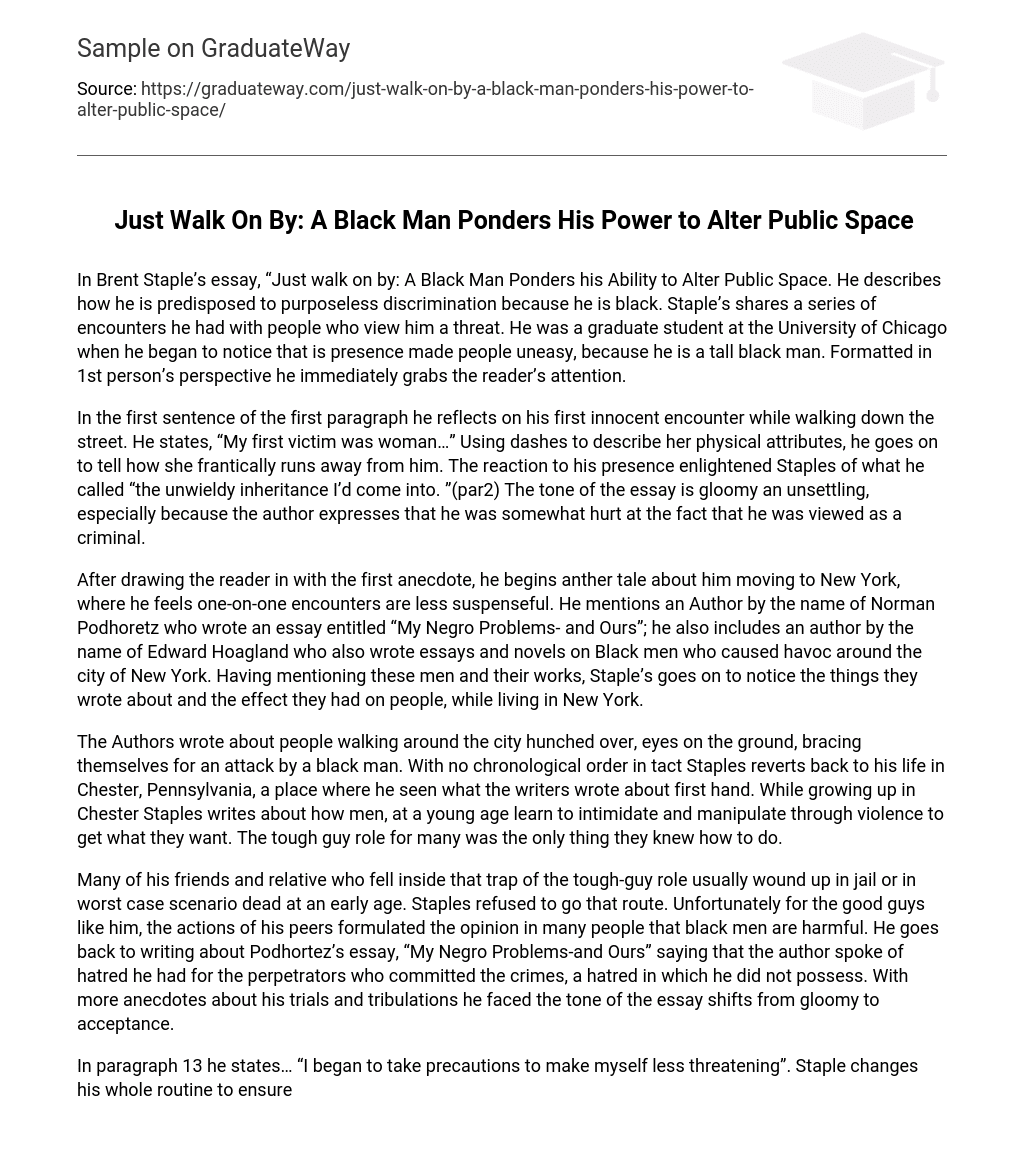Brent Staples’ essay, titled “Just walk on by: A Black Man Ponders his Ability to Alter Public Space,” delves into the discrimination he experiences as a result of being black. He shares various encounters in which people view him as a potential danger solely because of his height and race. These incidents originated during his time as a graduate student at the University of Chicago, when he realized that others felt uneasy simply due to his presence. By adopting a first-person narrative style, Staples effectively engrosses the reader right from the beginning.
In the opening sentence of the initial paragraph, the author nostalgically recalls his first innocent encounter while walking down the street. He uses dashes to describe the physical attributes of the woman who became his first victim and then explains her hurried departure from him. The woman’s response made Staples understand the weight he had inherited, which he calls “the unwieldy inheritance I’d come into.” The essay has a somber and unsettling tone, especially as the author acknowledges feeling somewhat hurt by being seen as a criminal.
After an intriguing introduction, the narrator discusses another tale of moving to New York City. According to the narrator, personal encounters in the city lack excitement. To support this point, two authors are mentioned: Norman Podhoretz and Edward Hoagland. These authors have written about the experiences of Black men in their works. For example, Podhoretz’s essay “My Negro Problems- and Ours” and Hoagland’s writings on the disruptive behavior of Black men in New York are referenced. The impact of these themes explored by the authors on residents of New York is acknowledged by Staple’s as he reflects on their influence.
The Authors discuss individuals in the city who walk with a bent posture, fixated on the ground, preparing themselves for an assault from a black man. Staples, devoid of any sequential order, reverts back to his experiences in Chester, Pennsylvania, where he witnessed firsthand what the writers previously described. Growing up in Chester, Staples details how men learned from a young age to employ intimidation and manipulation through violence to achieve their desires. For many, adopting the tough guy persona was their sole method of navigation.
Staples managed to avoid the fate of his friends and relatives who got caught up in a dangerous persona and ended up either in jail or, in the worst-case scenario, dead at a young age. However, this unfortunate association caused many people to view black men as dangerous. Staples brings up Podhortez’s essay, “My Negro Problems-and Ours,” and notes that the author expressed a hatred towards the criminals that he himself did not possess. By recounting his own personal experiences and challenges, Staples transforms the somber tone of the essay into one of acceptance.
In paragraph 13, the author mentions that he took precautions to appear less threatening. He modified his entire routine to ensure that others felt comfortable. For instance, he avoided walking too closely to people in subways and opted for different routes when alone near others. Additionally, he remained calm when stopped by the police for no reason. To minimize the chances of frightening encounters, he preferred walking late at night in areas with fewer people. He also describes how he decided to whistle tunes from Beethoven and Vivaldi as a way to alert people of his presence without startling them.
Staples compares his whistling to a cow bell used by hikers in bear country in the last sentence. This statement alone is enough to evoke tears from the reader. With the tone shifting in unimaginable ways, it becomes difficult for the reader to lack sympathy towards what the author depicts as his life. However, a flaw of this essay is its primary use of first-person perspective, which limits access to the thoughts of those he refers to as his victims. Nonetheless, Staples’ anecdotes effectively educate those who are quick to judge individuals based on appearances that not all people who walk late at night are inherently bad.





